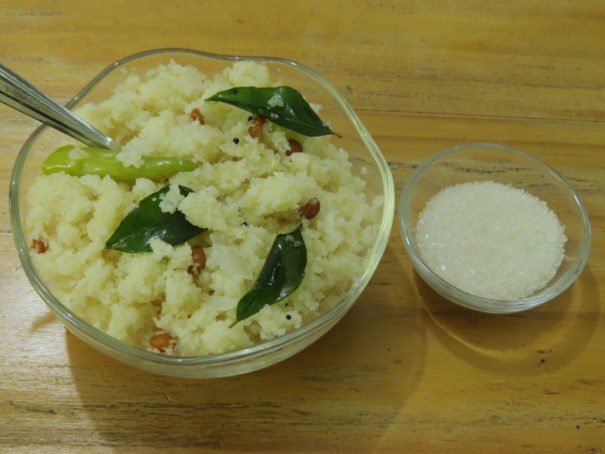
Being Thankful for Small Mercies and Semolina

Being Thankful for Small Mercies and Semolina
Upma in Chennai
I quite enjoyed the sound of water lapping against the compound wall as vehicles passed by. It had been raining on and off for a month, and the latest spell flooded our streets. I was not unduly worried when the rainwater started inching up the pathway to the rear of our house.
But then a power failure woke us up in the middle of the night, and we found about 15 inches of water inside the house. It was the flood of December 2015, which engulfed the southern Indian city of Chennai and made news internationally.
No power meant no water. We moved to my sister’s apartment. Five days later, when the water subsided and power supply was restored, my husband and I came back early in the morning to clean the house. Lopsided wooden furniture, scattered wet clothes, books on muddied floors, cockroaches, and an unbearable stench greeted us.
Midway through the cleaning, when I felt hunger pangs, I went into the kitchen to make breakfast. There was absolutely nothing. Because I cook out of necessity, I don’t stock up on anything except essentials. Without power, the dosa batter in the fridge had fermented into a yucky, smelly mess. The wheat flour was full of fungus. The shops had run out of supplies because supply trucks could not enter the marooned city.
I panicked. Already I was tired from the cleaning, which was extremely difficult and time-consuming. And I am the kind who will literally faint if I skip a meal. Counting on the wheat flour, I had not brought anything from my sister’s house. Then my husband rummaged in the kitchen and found a pack of semolina, or broken wheat middlings.
Upma made with semolina, or rawa, as it’s called locally, was not a favorite food of mine. Simple and easy to make, many rustle it up when guests come unannounced. Though some add vegetables, what my husband made that day was its plainest version, with just a sprig of curry leaves picked from our neighbor’s tree for seasoning. With no ingredients to make chutney, we ate the upma with sugar.
It wasn’t the grandest of breakfasts, but it was delicious. I never thought that I would cry over food. But I did, over my upma. We had been so fortunate; we had not been displaced by the floods—or worse. With a simple breakfast my attitude changed. I no longer think “ugh” when I think of upma, or gripe about inconveniences. I am thankful for small mercies.